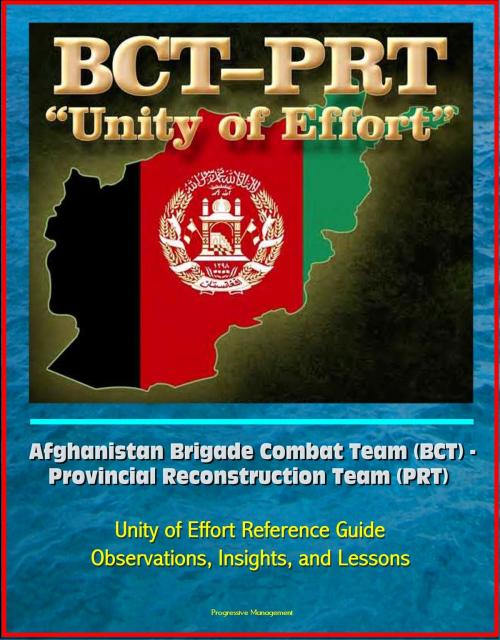Afghanistan Brigade Combat Team (BCT) - Provincial Reconstruction Team (PRT) Unity of Effort Reference Guide, Observations, Insights, and Lessons
Nonfiction, History, Military| Author: | Progressive Management | ISBN: | 9781301449088 |
| Publisher: | Progressive Management | Publication: | February 4, 2013 |
| Imprint: | Smashwords Edition | Language: | English |
| Author: | Progressive Management |
| ISBN: | 9781301449088 |
| Publisher: | Progressive Management |
| Publication: | February 4, 2013 |
| Imprint: | Smashwords Edition |
| Language: | English |
This is a reference guide for brigade combat team (BCT) commanders and staffs, Battalion commanders and staffs, Provincial reconstruction team (PRT) commanders and staffs, and U.S. government/interagency (IA) representatives serving with BCTs, battalions, and PRTs.
The brigade combat team (BCT) (or brigade task force [BTF]) and the provincial reconstruction team (PRT) have responsibilities for governance, security, development, and information lines of effort (LOEs) within a defined geographical area of responsibility; however, component elements of the task force do not always plan or execute together. There is a distinct challenge for the task force commander, his staff, and the subordinate PRTs and maneuver battalions/task forces to achieve true "unity of effort" amongst themselves. Contributing factors include:
• Rotation schedules of BCTs and PRTs are not synchronized.
• BCTs and PRTs rarely train together during predeployment.
• PRT composition is multicomponent, multiservice, and interagency — with different cultures and operating practices.
• Personalities/personality conflicts can be a major factor.
• Multiple reporting channels detract from synchronization.
The guide is designed to help BCT and PRT leaders and staffs (civilian and military) establish "unity of effort" among their organizations at the very outset of operations in theater.
Provincial Reconstruction Teams (PRTs) will assist The Islamic Republic of Afghanistan to extend its authority in order to facilitate the development of a stable and secure environment in the identified area of operations and enable Security Sector Reform (SSR) and reconstruction efforts.
Introduction * Chapter 1 * Environment and Missions * Chapter 2 * Goals and Metrics * Chapter 3 * Approaches * Chapter 4 * Roles and Responsibilities * Chapter 5 * Reassessment and Adjustment * Chapter 6 * Other Considerations * Chapter 7 * Organizations and Structures * Chapter 8 * Glossary
This is a reference guide for brigade combat team (BCT) commanders and staffs, Battalion commanders and staffs, Provincial reconstruction team (PRT) commanders and staffs, and U.S. government/interagency (IA) representatives serving with BCTs, battalions, and PRTs.
The brigade combat team (BCT) (or brigade task force [BTF]) and the provincial reconstruction team (PRT) have responsibilities for governance, security, development, and information lines of effort (LOEs) within a defined geographical area of responsibility; however, component elements of the task force do not always plan or execute together. There is a distinct challenge for the task force commander, his staff, and the subordinate PRTs and maneuver battalions/task forces to achieve true "unity of effort" amongst themselves. Contributing factors include:
• Rotation schedules of BCTs and PRTs are not synchronized.
• BCTs and PRTs rarely train together during predeployment.
• PRT composition is multicomponent, multiservice, and interagency — with different cultures and operating practices.
• Personalities/personality conflicts can be a major factor.
• Multiple reporting channels detract from synchronization.
The guide is designed to help BCT and PRT leaders and staffs (civilian and military) establish "unity of effort" among their organizations at the very outset of operations in theater.
Provincial Reconstruction Teams (PRTs) will assist The Islamic Republic of Afghanistan to extend its authority in order to facilitate the development of a stable and secure environment in the identified area of operations and enable Security Sector Reform (SSR) and reconstruction efforts.
Introduction * Chapter 1 * Environment and Missions * Chapter 2 * Goals and Metrics * Chapter 3 * Approaches * Chapter 4 * Roles and Responsibilities * Chapter 5 * Reassessment and Adjustment * Chapter 6 * Other Considerations * Chapter 7 * Organizations and Structures * Chapter 8 * Glossary















